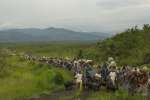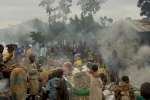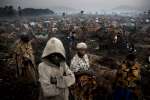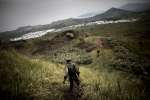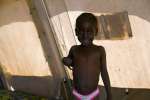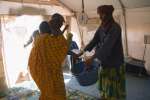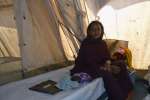UNHCR and the Norwegian Refugee Council sign agreement to improve the protection of displaced people
News Stories, 29 May 2006

GENEVA, May 29 (UNHCR) – UNHCR and the Norwegian Refugee Council (NRC), two leading organisations working for the protection of refugees, signed an agreement Monday which aims to improve the protection of displaced people worldwide.
There are close to 25 million people around the world who are refugees in their own countries. They have fled persecution or conflict, but they have not crossed an international border. In the jargon of the humanitarian agencies, they are known as internally displaced persons, or "IDPs." Without the safeguards and assistance afforded refugees, IDPs constitute probably the largest group of vulnerable people in the world today.
With Monday's agreement, UNHCR and NRC will be pursuing a more strategic partnership, at the global level as well as in specific operations, with emphasis on closer cooperation in the field to protect and assist IDPs.
"NRC's systematic approach to working with IDPs globally makes them an essential partner for UNHCR," said High Commissioner António Guterres, who signed the agreement at UNHCR's headquarters. He also stressed the need to extend this alliance to other partners.
The two agencies cooperate in many countries, including Colombia, Uganda and Sudan. In Liberia, for example, UNHCR and NRC work closely to carry out protection monitoring of returning IDPs and refugees.
On signing the agreement, NRC Secretary-General Tomas Colin Archer highlighted the importance of coordination among humanitarian agencies in field operations, as well as the need to register IDP populations to better meet their needs.
"This agreement will further enhance the close cooperation between our two agencies," he said.

In a recent revision of how humanitarian agencies jointly approach IDP situations, UNHCR has taken the lead for protection, camp management and emergency shelter, and is tasked with developing strategies and coordinating the work of other agencies and non-governmental organizations in these areas.
The Norwegian Refugee Council is one of the world's leading non-governmental organisations working on humanitarian issues. NRC has a solid international standing through its operations in the field, the secondment of personnel to inter-governmental agencies and its advocacy and training work. NRC's main focus on international refugee work has gradually been broadened to include the growing number of conflict-induced internally displaced persons.
Through the activities of its Internal Displacement Monitoring Centre (formerly known as the Global IDP Project), NRC collects and analyses IDP-related information, advocates for the rights of the displaced and provides training on IDP protection. NRC has some 1,300 staff worldwide.



















